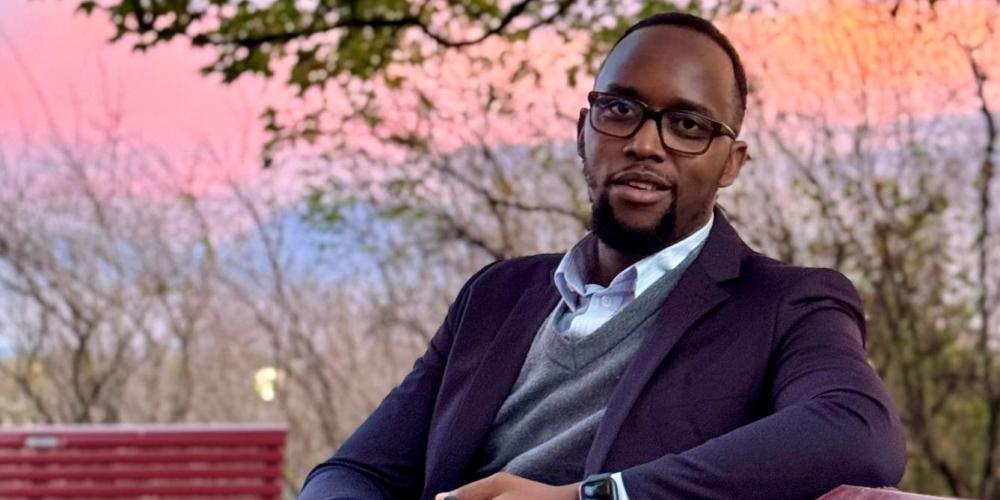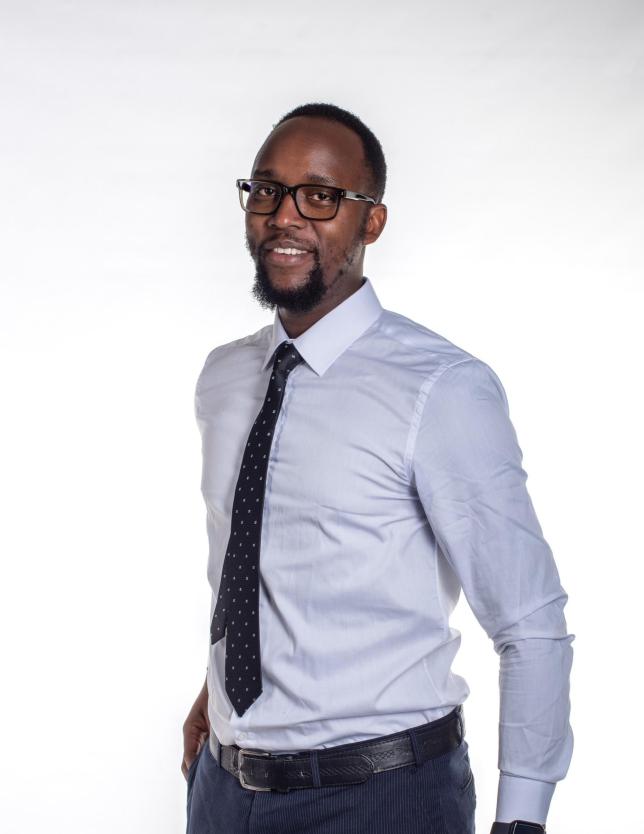
Samuel Baker Byansi writes about politics, corruption, and conflict in the Great Lakes region. These topics did not (and do not) sit well with the regime of President Paul Kagame. Out of concern for his safety, the Rwandan investigative journalist and human rights activist was forced to flee his homeland. From Europe, he continues his fight in exile. “Samuel Baker Byansi embodies the ideals of free thought and speech,” says philosopher Alisja Gescinka, who nominated him for the Honorary Title for Freedom of Expression to be awarded on Difference Day 2025. “It takes courage to engage in critical journalism in a country where dissenting voices are silenced.”
A fully independent media sector has never existed in Rwanda, writes Samuel Baker Byansi in his book ‘From Watchdog to Traitors: The Less You Know, The More You Believe’. A tragic low point was Radio Télévision Libre des Mille Collines, the propaganda station infamous for the inflammatory content it spread, which contributed to the 1994 genocide against the Tutsi. This genocide profoundly influenced Samuel Baker Byansi's career. “As a child, I witnessed how information was manipulated to serve political interests and silence dissenting voices. Since then, I’ve grown to understand that good journalism must uphold truth and hold power accountable. For me, journalism is not merely a profession, but a calling that requires courage, integrity, and an unwavering commitment to truth above neutrality. Misinformation can have unimaginably tragic consequences. That’s why journalists must not only report but also demand accountability and strive for justice.”
Has press freedom come under increased pressure since Paul Kagame took office in 2000?
Samuel Baker Byansi: “The years following the genocide offered a window of opportunity to learn from past mistakes and work toward a more independent media environment. Unfortunately, the Kagame administration chose the opposite path. Reporters Without Borders ranked Rwanda 144th out of 180 countries in the 2024 World Press Freedom Index.”
How is press freedom suppressed in Rwanda?
“Nearly all media outlets are controlled or influenced by the state. The government uses misinformation and propaganda to shape public perception. The regulatory body is essentially an extension of the ruling party. Dissenting voices and critical journalists are labelled as ‘enemies of the state’ and silenced. The police intelligence services play a harmful role in creating a climate of fear. This is detrimental to independent journalism.”
‘They participate in critical discussions, despite the risks involved’
How does the Rwandan population view this?
“Due to fear of reprisals, almost no one dares to openly criticize. Decades of state propaganda have also deeply influenced public opinion. For many, dissent equates to destabilization—they see criticism as a threat rather than as a necessary part of democratic debate. However, this dynamic is gradually changing, thanks to the rise of digital platforms and increased access to independent information sources. More and more Rwandans are questioning the official narrative. They seek alternatives and engage in critical discussions, despite the risks involved.”

You’ve personally experienced those risks, haven’t you?
“I have been intimidated, censored, threatened, prosecuted, and arrested multiple times. On one occasion, I was even tortured. I’m not the only one who has faced this. Journalists who publish critical or independent content in Rwanda run a high risk of being detained. This is often justified with vague charges such as ‘spreading rumours’ or ‘inciting rebellion.’”
That would lead anyone to self-censor, wouldn’t it?
“Many journalists deliberately avoid sensitive topics out of fear of reprisals. This is even true for journalists in neighbouring countries like the Democratic Republic of Congo, Burundi, and Uganda, as the Rwandan regime’s crimes have an impact there as well. Even Rwandan exiles in Belgium, France, and Canada aren’t safe. They are monitored and pressured to remain silent.”
Which piece of investigative journalism of yours has had the most impact?
“In the international investigative project ‘Rwanda Classified,’ we exposed the circumstances surrounding the death of journalist John Williams Ntwali and the repressive tactics of the Rwandan government, including assassination attempts, surveillance technology, and the use of financial networks to suppress dissent. I also conducted in-depth research into the alleged involvement of Rwandan forces in supporting the M23 rebel group in the Democratic Republic of Congo. My investigation provided evidence of the illegal exploitation of valuable resources in conflict zones and their smuggling through rebel-controlled areas into Rwanda. This work has contributed to greater awareness of the links between armed conflicts, resource exploitation, and regional instability.”
Ultimately, you had to flee your homeland. That must have been a heavy sacrifice.
“I did not take that decision lightly. The threats against me kept mounting, and I had to find a safe environment to continue my work. Going into exile was a heartbreaking decision, as I was forced to leave behind my familiar home, my extended family, my friends and colleagues, and my beloved country, Rwanda. The emotional toll of that separation cannot be expressed in words. Exile is more than just physical displacement. You lose your connection to your roots, your culture, and your identity.”
‘Use your privilege to amplify the voices of colleagues from regions where such freedoms do not exist’
Yet you persist with your work.
“I continue to seek truth, defend press freedom, and expose injustices. My exile has only strengthened my conviction in the importance of this mission. Wherever press freedom is restricted, courageous, independent journalism must hold power accountable and give a voice to the voiceless.”
You co-founded Unité M28 / M28 Investigates. What is it?
“With Unité M28 / M28 Investigates, we provide training, mentorship, and collaboration opportunities for aspiring journalists in Sub-Saharan Africa. We specialize in advanced investigative journalism techniques, best practices in digital security, and ethical reporting. This helps young journalists acquire the skills and confidence needed to tell critical, challenging stories.”
What does receiving the Difference Day Honorary Title mean to you?
“I am incredibly honoured by the recognition, which holds deep personal significance and affirms the sacrifices I have made in my pursuit of truth. It is also a tribute to the countless journalists who risk their lives and freedom to report on important issues, often under difficult and dangerous circumstances. Finally, it is a call to action for the international community. They must stand up for journalists, apply pressure on repressive regimes, and demand that countries like Rwanda respect the rights of their citizens so they can express themselves freely and without fear of reprisals.”
Do you have a message for young journalists?
“To those working in oppressive environments: stay resilient, find networks that support you, and use digital tools to uncover the truth safely. To European or Belgian journalists: never take press freedom for granted. Use your privilege to amplify the voices of colleagues in regions where such freedoms do not exist.”